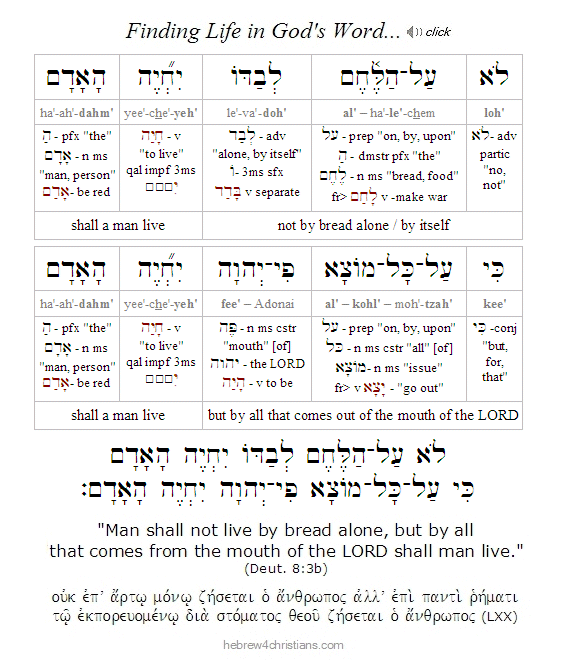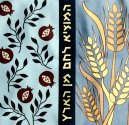|
The sages state, "If there is no bread, there is no Torah; and if there is no Torah, there is no bread" (Pirke Avot 3:17). Our Torah portion this week begins, "If you walk in my statutes ... you shall eat your bread ... and I will give peace ... and none shall make you afraid" (Lev. 26:3-5). In other words, though Torah study may not literally "bake bread," it nevertheless provides the means by which bread itself will have any real significance to us... After all, what good is bread if there is no real blessing of peace?
Though the Torah was not given for the sake of this world (i.e., so we could eat and drink), it nevertheless provides the means by which we can study God's truth and fulfill His commandments, and by so doing, enter into the world to come. The sages affirm, "This world is like a corridor before the World to Come; prepare yourself in the corridor, that you may enter into the hall" (Avot 4:21), which implies that the great commandment is always דִּרְשׁוּנִי וִחְיוּ - "Seek Me and live" (Amos 5:4). As Isaiah cried out, "Seek the LORD while he may be found; call upon him while he is near..."
When Yeshua our Lord was tempted with physical hunger in the desert, he rebuked the evil one by quoting the Torah, "Man shall not live by bread alone, but by every word that comes from the mouth of God" (Matt. 4:4; Deut. 8:3). Man shall not live by bread alone, though bread nevertheless is the means by which we are physically sustained so that we can study "every word that comes from the mouth of God."
כִּי לא עַל־הַלֶּחֶם לְבַדּוֹ יִחְיֶה הָאָדָם
כִּי עַל־כָּל־מוֹצָא פִי־יהוה יִחְיֶה הָאָדָם
kee lo al-ha·le'·chem le·va·do yeech·yeh ha·a·dam;
kee al-kol-mo·tza fi-Adonai yeeh·yeh ha·a·dam

"Man does not live on bread alone, but by everything that comes
from the mouth of the LORD does man live"
(Deut. 8:3)

Whenever we eat food, we incorporate other life as a means of nourishment for our own. Physical bread temporarily sustains our physical life. After it's digested, however, we find ourselves in need of it once again. God has designed the human body so that its life requires sacrifice....
Although physical food helps us survive, we must ask the question, for what end? Do we live for the sake of eating (and thereby live to eat for another day, and so on), or do we eat in order to live? If the latter, then what is the goal of such life? What is the source of its nutrient and where is it taking you? What does your soul or "inner man" feed upon to gain the spiritual will to live?
Both the written Torah and Yeshua (who is the living embodiment and inner expression of all that the Torah really means) make it clear that we receive sustenance from the Word of God (דְּבַר הָאֱלהִים), the Source of spiritual life. The word of God is the message of the very love of God that is always sustaining us -- whether we are conscious of this or not. God provides lechem ha-chayim (לֶחֶם הַחַיִּים), the "Bread of Life," through the Torah of his Son (John 6:35). As Yeshua promised, whoever comes to Him shall not hunger, and whoever believes in Him shall never thirst (John 6:48).
|



